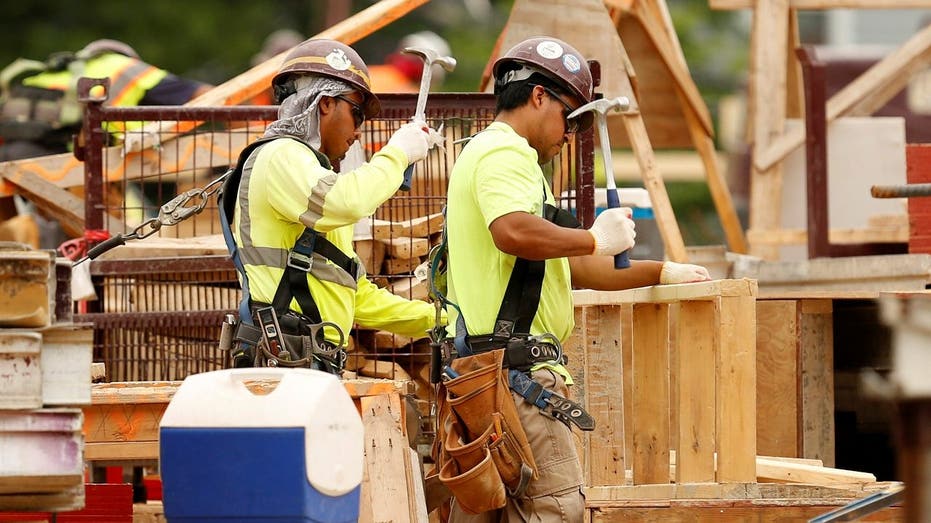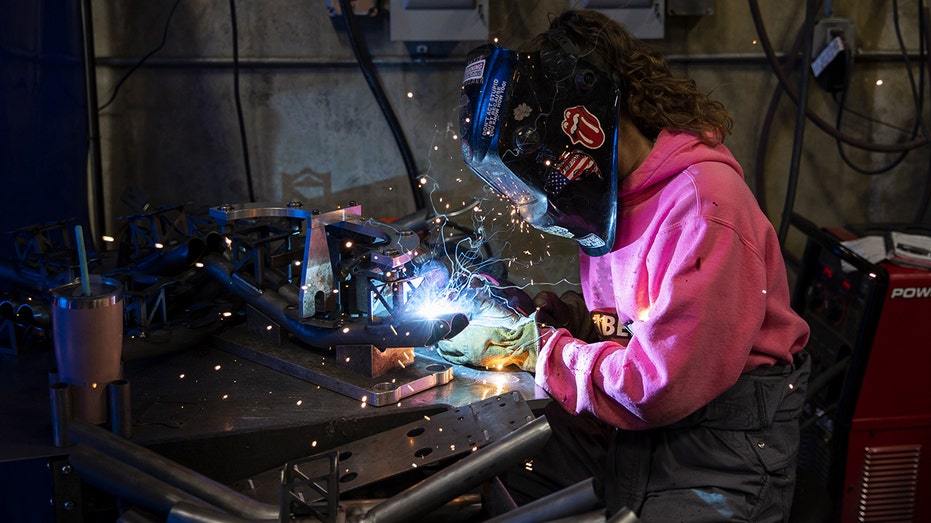America's skilled worker shortage impacting construction, manufacturing industries
The U.S. economy had nearly 1 million job openings in the construction and manufacturing industries in June
The huge demand for skilled workers hurt by young generations fear of hard work: Andrew Crapuchettes
RedBalloon CEO Andrew Crapuchettes explains how the baby boomer generation has left a stigma on blue or mixed-collar work.
America’s shortage of skilled workers is impacting the ability of businesses in the construction and manufacturing industries to staff their businesses and complete jobs on time, prompting a search for a new type of talent pipeline for skilled workers to address the shortfall.
The Bureau of Labor Statistics job openings report for June 2023 found that the construction industry had roughly 374,000 job openings while manufacturing had 582,000. While the number of job openings in the two sectors shrank by about 279,000 combined openings compared to a year ago, the total remained near one million job openings for those two sectors out of the roughly 8.5 million open jobs economy-wide.
"The problem that we’re facing today is that a lot of the workforce that’s been engaged in those roles is retiring and we’re not replenishing the workforce with new recruits into these jobs because the Millennial and Gen Z generations – they kind of grew up with a different idea in mind of what was a well-paying and what was a very meaningful job," Aidan Madigan-Curtis, a partner at venture capital firm Eclipse, told FOX Business.
"They’ve been taught that they need to learn how to code and they’ve been taught that the future is digital. And while obviously at Eclipse we deeply agree with the digitization of many of these industries, there’s still a huge role for the human element in human-machine interaction," she added.
DEMAND FOR SKILLED WORKERS ON THE RISE

There are nearly 1 million job openings in sectors like construction and manufacturing that employ skilled workers. (REUTERS/Gary Cameron - RTX2FCR6 / Reuters Photos)
Madigan-Curtis noted that the shortage of skilled workers is delaying work on projects funded by the CHIPS Act – which provided $52 billion in subsidies aimed at boosting the U.S. semiconductor industry – because U.S. chipmakers are dealing with a shortage of workers to build the fabs, including electricians and workers in other trades, and to operate them. She added that there’s currently a shortage of about 750,000 machinists and welders which is expected to climb to 2 million to 2.5 million in the next several years.
Eclipse focuses its investment portfolio on companies aiming to revitalize physical industries like construction and manufacturing. One of its portfolio companies is Forge, a startup founded to address the shortage of workers in skilled trades.
"We run what’s effectively a private trade school with the biggest difference being we pay people to learn rather than charge them to learn as they go through the program," Mark Kasdorf, founder and CEO of Forge, told FOX Business. "We surround them with technology to create what we call the tech-enabled worker and we hire roughly the top 80-90% of our class into our company. Our customers are mostly companies like Home Depot, Marvin Windows, Pella Windows, large developers, people that need large pools of labor to build and install things."
THE US HOUSING MARKET MAY BE TRAPPED IN A PROLONGED FREEZE

A worker welds together bumpers for a three-wheeled electric fun utility vehicle (FUV) at the Arcimoto manufacturing facility in Eugene, Oregon. - There's a shortage of roughly 750,000 machinists and welders impacting the manufacturing and constructi (Alisha Jucevic/Bloomberg via Getty Images / Getty Images)
Forge operates a 12-week apprenticeship program in which apprentices are paid $15 an hour to learn carpentry skills intended to prepare them to join specialized crews in the field. According to Forge, about 71% of the participants in a typical apprentice class have no prior professional trades experience and 69% of apprentices ultimately graduate.
Most graduates are hired into a full-time role with the Forge pro team where they get a raise, medical insurance, a 401(k) retirement plan and other benefits. Forge’s crews specialize in areas like window installation, cabinet installation, and trim work. Apprentice graduates continue to learn from more experienced pros in small crews and get performance feedback on a quarterly basis.
LOWE’S FOUNDATION INVESTS $50M TO ADDRESS ‘CRITICAL’ TRADESPEOPLE WORKER SHORTAGE

Construction startup Forge pays and trains apprentices, then hires many graduates into its own construction crews. ((Photo by Joe Raedle/Getty Images) / Getty Images)
Kasdorf said that for most new construction workers who aren’t involved in some form of an apprenticeship program, "What you’re likely going to do for the first year is hand things to people on ladders and carry cement and mix cement and hand people roofing shingles because everything requires relatively hard to acquire skills. Plastering is hard. Framing is hard, and if you mess up something small in framing you’ll fail inspection, things won’t be square."
Forge connects apprentices with experts in certain narrowly focused aspects of building trades who can help them deal with some of the unique situations that arise in construction settings that can’t always be accounted for in training or classroom settings.
GET FOX BUSINESS ON THE GO BY CLICKING HERE
"We can get someone competent in window installation in about three months, we can get them leading a crew in nine months. And even when they’re leading a crew, once a week they’re going to see something they’ve never seen before," Kasdorf said. "The reason we can get a 24-year-old leading a crew is in that moment they can have a 55-year-old expert look through their eyes and help them triage that situation that they’ve never experienced before."




















